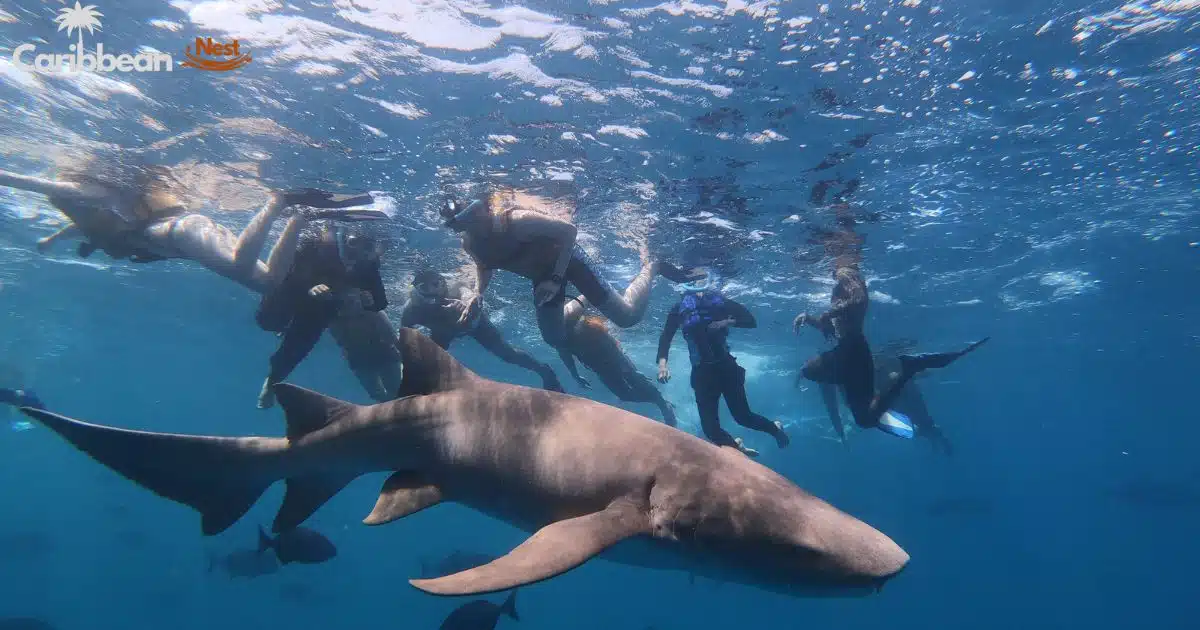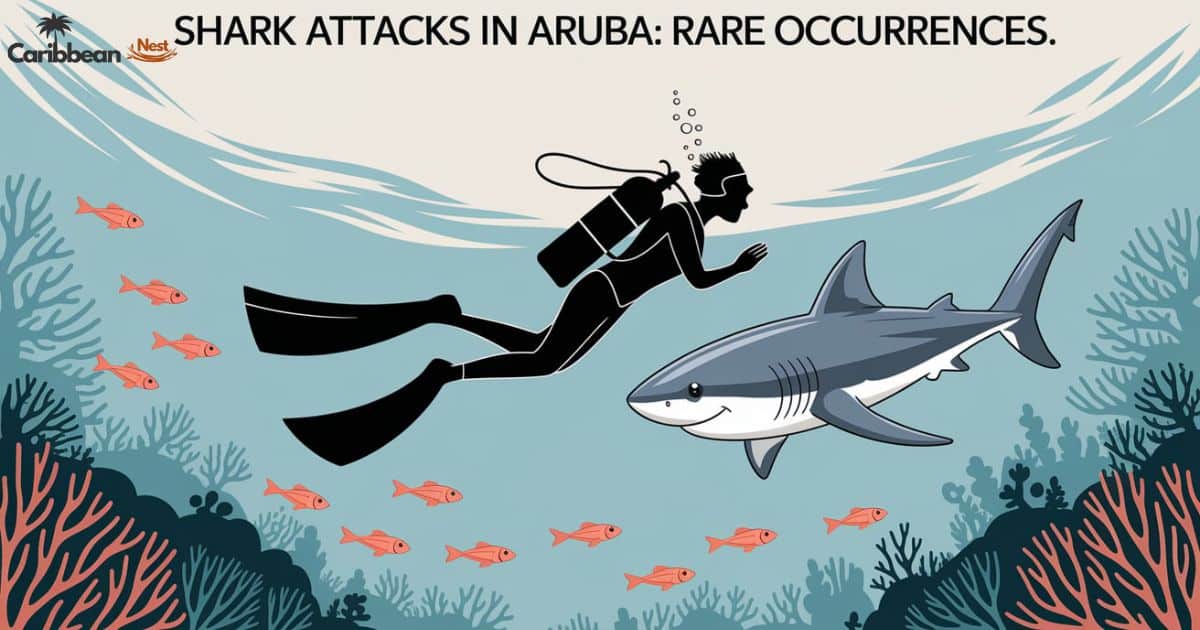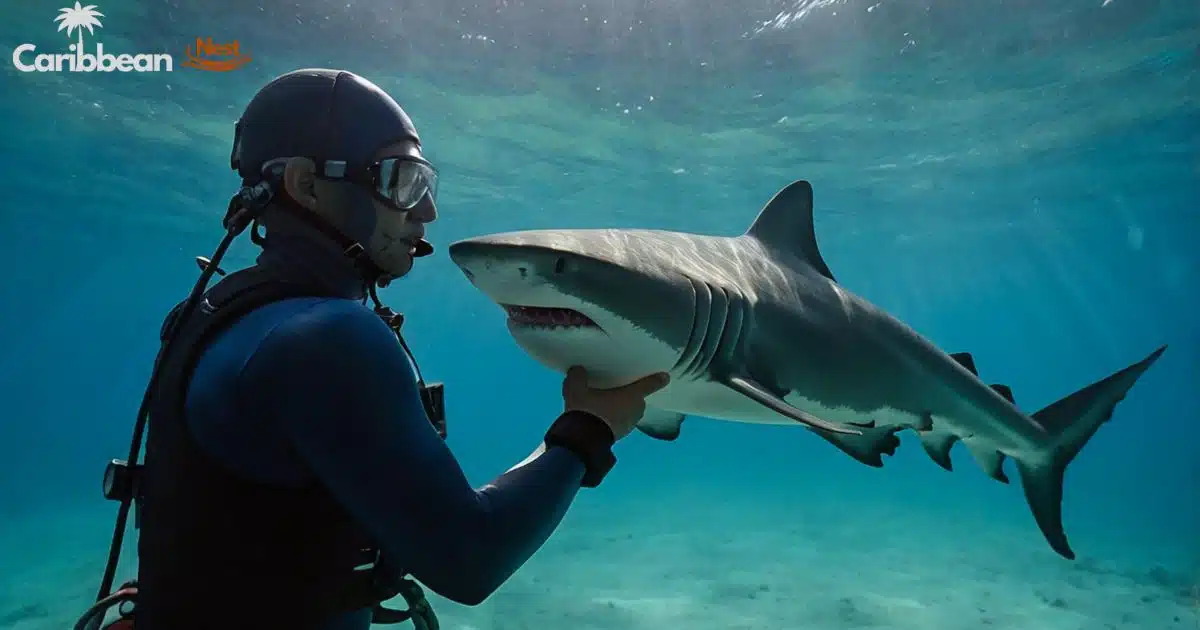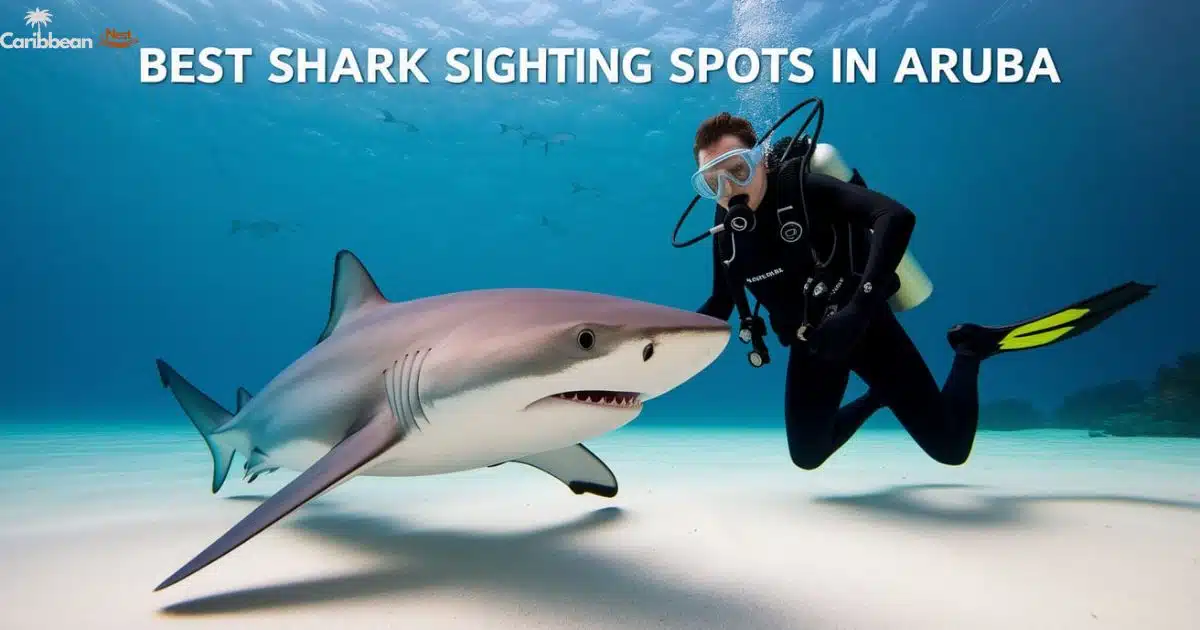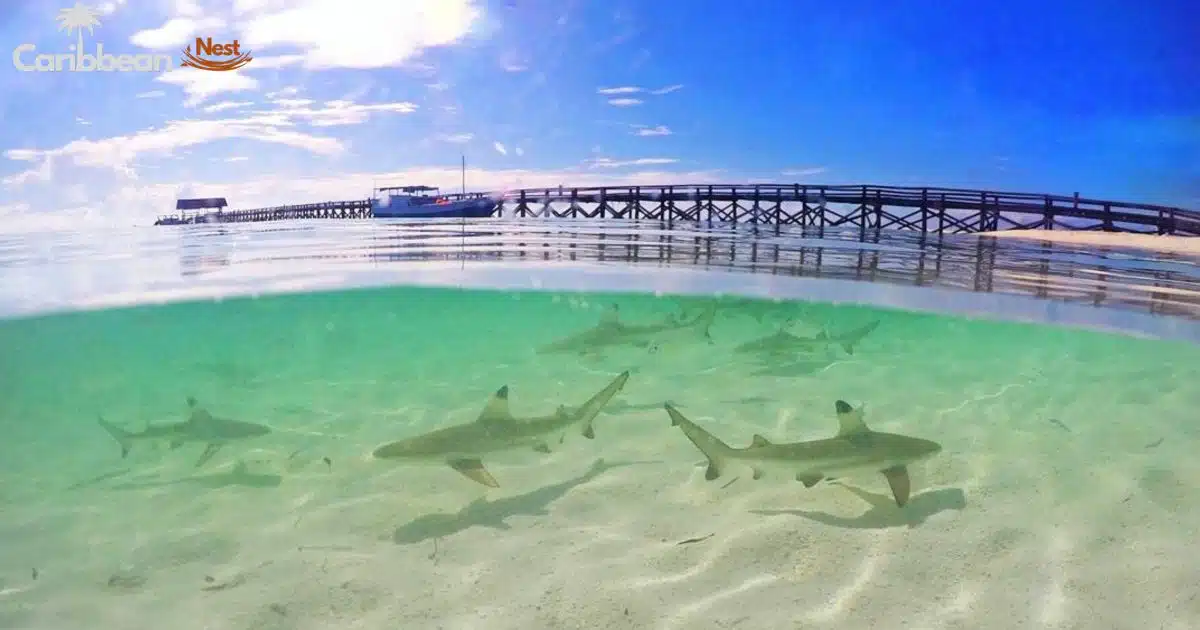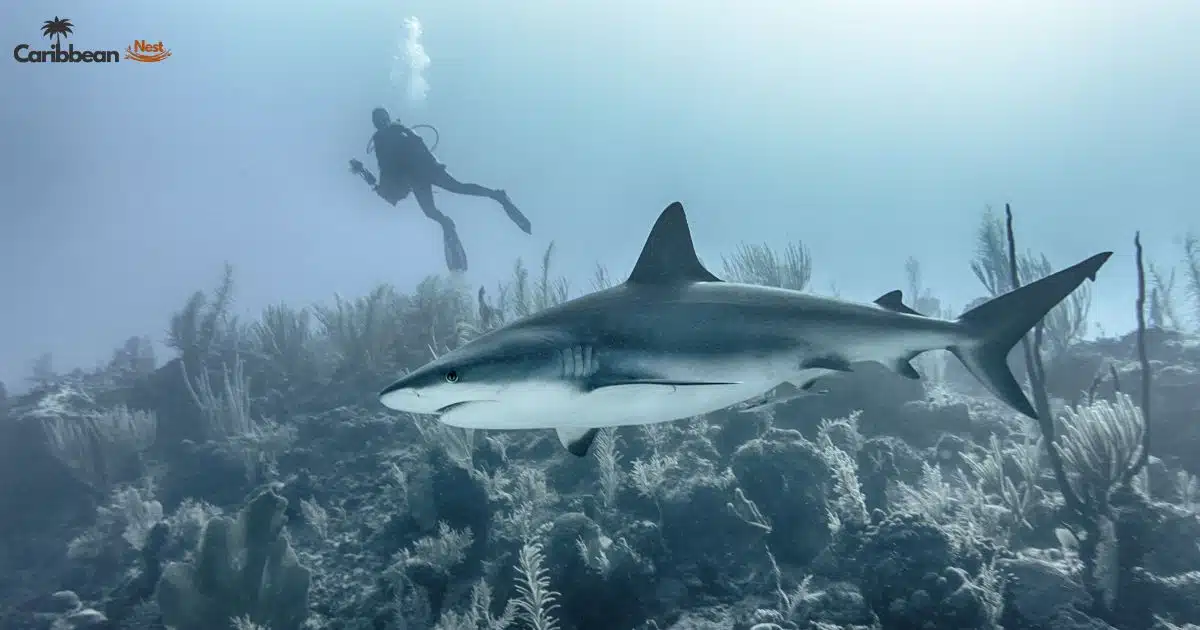Are you wondering if sharks in Aruba pose a risk to your vacation plans? While it’s natural to be curious, rest assured that sharks in Aruba are not a major concern for swimmers, snorkelers, or divers. Most sharks around Aruba prefer the deeper waters far away from the bustling beaches where tourists relax.
The island is home to several Caribbean shark species, including the Caribbean Reef Shark and Nurse Sharks, but these creatures are generally shy and non-aggressive. The chances of encountering one near the shore are extremely low. This guide will provide all the information you need on shark behaviour in Aruba, safety tips, and more to ensure a worry-free experience.
Are there sharks in Aruba?
If you’re planning a trip to this tropical paradise, it’s natural to wonder if sharks live in the waters. The short answer is yes, sharks do inhabit the waters around Aruba, but the chances of encountering one while enjoying the island’s beaches or snorkelling are extremely low. This guide will walk you through everything you need to know about sharks in Aruba, including which species are common, how safe it is to swim, and tips on staying safe while enjoying the ocean.
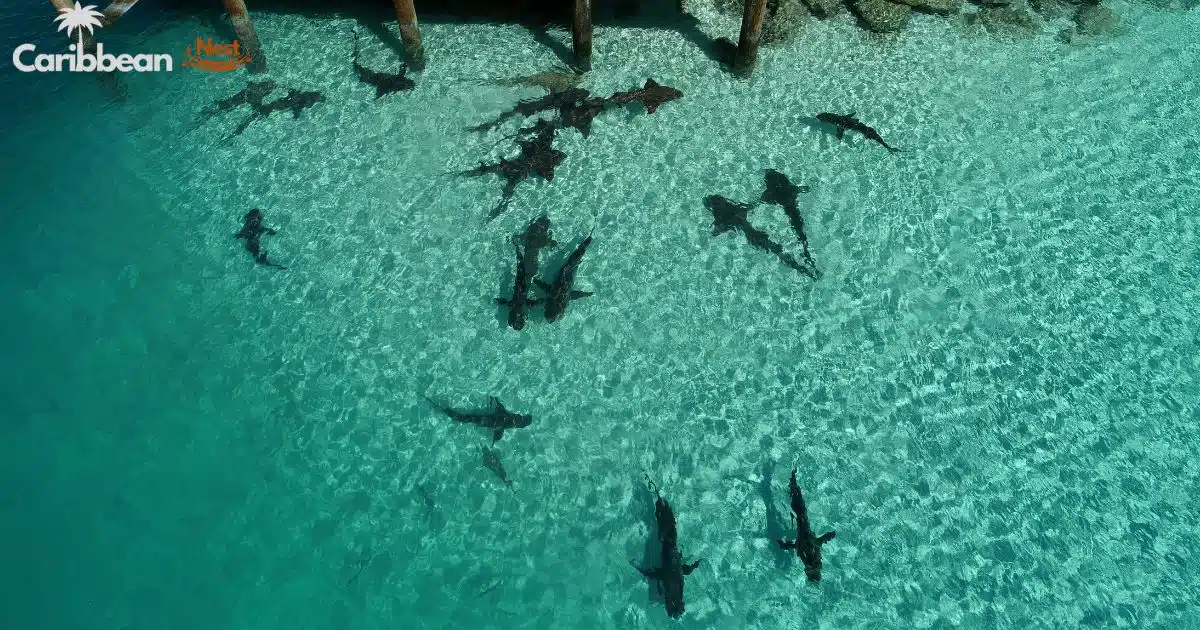
Suppose you’re planning to swim, snorkel, or dive in Aruba. In that case, it’s essential to remember that sharks tend to avoid areas with high human activity. The clear waters and abundant marine life of Aruba attract several species of Caribbean sharks. Still, these creatures rarely come close to shore. So, while shark encounters in Aruba are possible, they are not something to be concerned about.
15 Essential Packing Items for Aruba
Packing smart for Aruba is key to a stress-free trip. From reef-safe sunscreen to lightweight clothes and comfy footwear, having the right essentials keeps you ready for sunshine, culture, and adventure in this Caribbean paradise.
Common Shark Species in Aruba
Aruba’s warm waters are home to a diverse range of shark species, some of which are more frequently encountered than others. The most commonly spotted sharks in Aruba include the Caribbean Reef Shark, the Nurse Shark, and the Blacktip Shark. These sharks are typically shy and non-aggressive, preferring to stay in deeper waters away from people. Whale sharks in Aruba are another rare sight. However, their presence in Aruba is minimal due to their migratory nature and preference for open ocean waters.
It’s important to note that sharks such as the tiger shark and the hammerhead shark are not commonly found near shore. These larger sharks prefer deep water and are usually not encountered unless you are on a deep dive. Even then, they are not likely to pose any danger to you. Understanding shark behaviour in Aruba can help ease any fears you may have, as these creatures are typically more afraid of humans than the other way around.
 Caribbean Reef Sharks
Caribbean Reef Sharks
One of the most common sharks you might encounter while diving or snorkelling in Aruba is the Caribbean Reef Shark. These sharks are usually around 6 feet long and are often seen patrolling the reefs. They are known to be shy and will usually swim away when they notice humans. These sharks primarily live in Caribbean Reef Shark habitats near coral reefs and drop-offs, making them a frequent sight for experienced divers.
Despite their size, Caribbean Reef Sharks are not dangerous. They are curious but avoid human contact, preferring to stick to their natural diet of fish and smaller marine creatures. Their presence in Aruba is an excellent opportunity for divers to spot them in their natural environment without any risk of harm.
Nurse Sharks and Blacktip Sharks
Nurse sharks in Aruba are often found resting on the ocean floor during the day, especially in shallow waters. These sharks are docile and non-aggressive, making them a familiar sight for snorkelers and divers alike. Nurse sharks can grow up to 10 feet long, but they are typically harmless to humans and will often ignore swimmers unless provoked.
On the other hand, Blacktip Sharks Aruba are a bit more active and agile. These sharks are smaller, growing to about 6 feet, and are often seen swimming along the coast. While they are more likely to be spotted during Aruba snorkelling spots, they are not known to be dangerous to humans. Like Nurse Sharks, Blacktip Sharks are more interested in small fish and crustaceans than in interacting with humans.
Shark Attacks in Aruba
The fear of shark attacks in Aruba is common, but in reality, such incidents are relatively rare. Shark attack statistics for Aruba indicate that the island has an excellent safety record, with only a few known shark attacks reported over the last several decades. The most common reason for a shark attack is when a shark mistakes a swimmer for its natural prey, but this is extremely unlikely in Aruba.
To stay safe, it’s essential to follow shark safety tips in Aruba, such as swimming in groups, avoiding the water at dawn or dusk when sharks are more active, and staying close to the shore. If you spot a shark, remain calm, avoid splashing, and slowly swim back to safety. Shark attacks in Aruba should not be a significant concern, especially if you follow basic safety guidelines.
Why Shark Attacks in Aruba Are Not a Major Concern?
Shark attacks in Aruba are almost unheard of due to the island’s low shark population near beaches. Most sharks found in Aruba are either Nurse Sharks, which are slow-moving and docile, or Caribbean Reef Sharks, which are generally not interested in humans. There have been no reported attacks involving tourists in recent years. By avoiding certain behaviours and following local guidelines, you can easily enjoy Aruba’s waters without any worry.
Snorkelling and Swimming in Aruba
Absolutely! Aruba’s calm waters and clear visibility make it an ideal destination for snorkelling. The island is known for having some of the safest swimming beaches in Aruba, where you can relax and explore without fear of encountering sharks. Most sharks in Aruba prefer to stay in deeper, more remote waters, so your chances of seeing one while swimming or snorkelling near the shore are virtually non-existent.
Whether you’re enjoying the shallow waters of Baby Beach or exploring the reefs at Mangel Halto, you can rest assured that you’re in safe waters. Aruba’s commitment to marine conservation also helps maintain a safe and thriving ecosystem for both locals and tourists to enjoy.
Best Spots to See Sharks in Aruba
If you’re hoping to catch a glimpse of a shark while in Aruba, you’re in luck. Aruba dive sites such as Boca Catalina and Isla di Ora are great spots for seeing sharks. These areas offer the chance to encounter Caribbean Reef Sharks, Blacktip Sharks, and occasionally Lemon Sharks in their natural habitats. Divers who venture into deeper waters may also spot the elusive Whale Sharks in Aruba, although sightings are rare.
While shark sightings in Aruba are not guaranteed, these Aruba snorkelling spots are some of the best places to try your luck. The clear waters provide excellent visibility, making it easy to spot sharks and other marine creatures. Whether you’re a seasoned diver or a beginner, there’s something magical about encountering these majestic creatures in the wildlife.
Top Shark Diving and Snorkelling Locations
Boca Catalina is one of the top Aruba snorkelling spots for those hoping to see sharks. The shallow coral reefs are home to several species of sharks, including the Caribbean Reef Shark. Isla di Ora, located off the coast of Aruba, is another prime location for spotting sharks while scuba diving. With its rich marine life and clear waters, Isla di Ora is known for attracting sharks, making it a must-visit destination for shark enthusiasts.
How to Stay Safe Around Sharks?
Although sharks are not a significant threat in Aruba, it’s still essential to follow shark safety tips to minimize the risk of any encounters. Always swim with a buddy and avoid swimming alone. If you’re diving, make sure to follow the safety guidelines set by your tour operator. Avoid swimming in murky water or wearing shiny jewellery that might attract sharks.
If you do spot a shark while swimming, stay calm, make slow movements, and avoid splashing. Sharks are usually more interested in small fish than humans, and by staying still, you signal to the shark that you’re not a threat.
Tips for Avoiding Sharks and Responding Calmly in an Encounter
Shark encounters in Aruba are rare, but it’s still good to know how to handle a situation if one arises. If a shark comes near you, don’t panic. Sharks are usually more curious than dangerous. Avoid turning your back on the shark and keep eye contact with it as you slowly move toward safety. By following these tips, you can ensure a safe and enjoyable experience in Aruba’s waters.
Do Hammerhead Sharks Live in Aruba?
Hammerhead shark sightings in Aruba are infrequent. These sharks prefer deeper waters and are not commonly found in shallows. If you spot a hammerhead, it’s likely to be in a more remote part of the island’s waters. Despite their large size and distinctive head, hammerhead sharks are generally not aggressive toward humans and are unlikely to pose a threat.
The Role of Sharks in Aruba’s Marine Ecosystem and Conservation Efforts
Sharks play a crucial role in maintaining the balance of Aruba’s marine ecosystem. As apex predators, they help regulate the populations of other species and preserve the health of the ocean ecosystem. To ensure the protection of sharks and their habitats, Aruba has implemented several initiatives aimed at shark conservation. These initiatives focus on preserving shark populations and educating the public about the importance of these creatures to the marine environment.
Why Shark Conservation in Aruba Is Vital for Local Waters ?
Shark conservation in Aruba is crucial for maintaining the health of the island’s marine ecosystem. Through efforts by organizations such as the Dutch Caribbean Nature Alliance, Aruba has implemented policies to protect sharks from overfishing and other threats. Protecting sharks is not only crucial for the species themselves but also for maintaining the delicate balance of the local ecosystem. By supporting these conservation efforts, Aruba ensures that future generations can enjoy its rich marine life.
Conclusion
Are sharks present in Aruba? Yes, but they are not something to be afraid of. With the proper knowledge and precautions, you can enjoy the island’s beautiful waters with confidence. Whether you’re swimming at one of the safe swimming beaches in Aruba or diving at one of the Aruba dive sites, you’re much more likely to encounter vibrant fish, colourful coral reefs, and other ocean life. By following shark safety tips and supporting shark conservation efforts, you can help protect these magnificent creatures and ensure that Aruba’s waters remain safe and healthy for years to come.
FAQ’s
1) Are sharks a concern in Aruba?
Sharks are present in Aruba’s waters, but encounters are rare, and attacks are extremely uncommon, making them of no major concern for visitors.
2) Which Caribbean Island has the least shark attacks?
Aruba has one of the lowest rates of shark attacks in the Caribbean, offering safe water for tourists.
3) Is it safe to swim in Aruba?
Yes, Aruba is known for its safe swimming beaches, with calm waters and minimal shark activity near shore.
4) Are there any predators in Aruba?
Aruba’s waters are home to sharks, but they are generally non-aggressive and pose no significant risk to swimmers.
5) Are there snakes in the ocean in Aruba?
There are no sea snakes in Aruba’s waters, ensuring a safe environment for swimmers and snorkelers.




